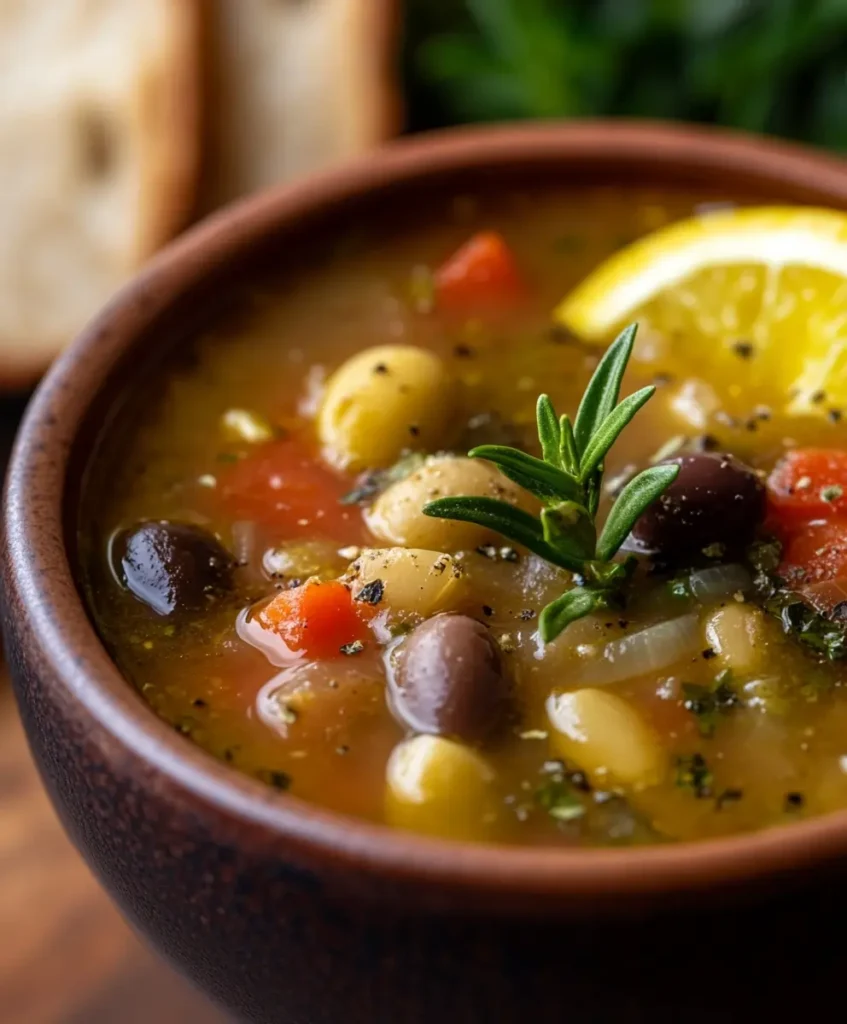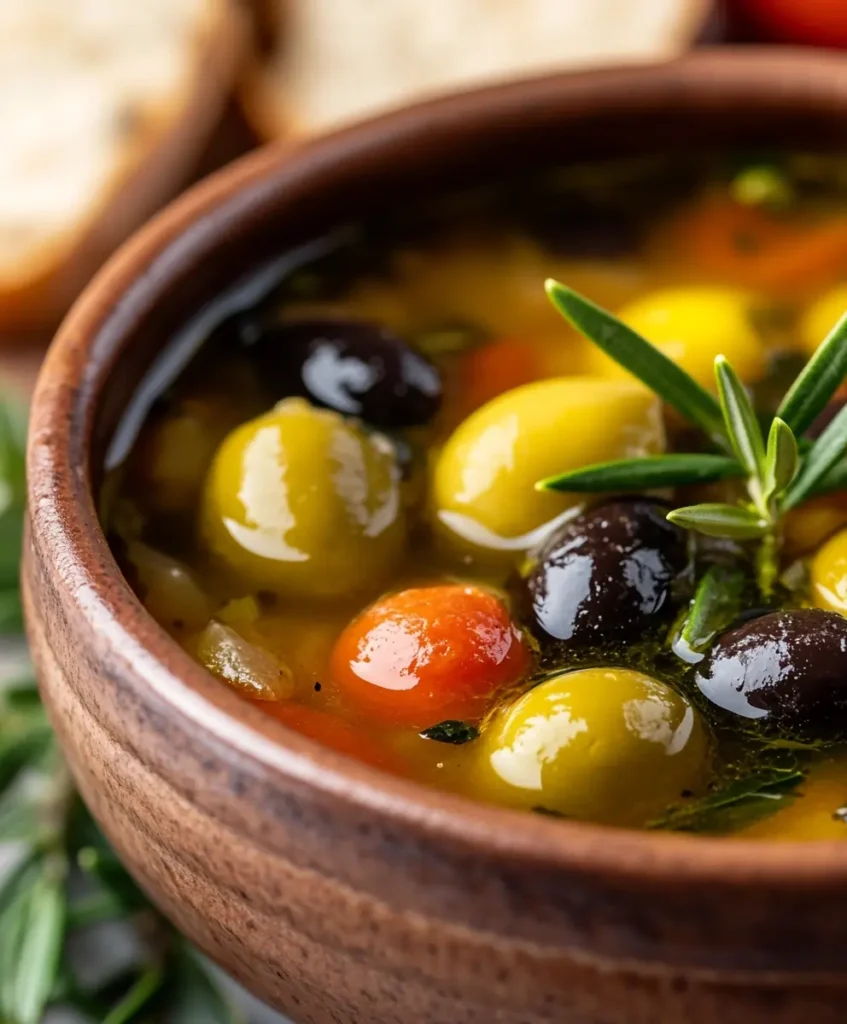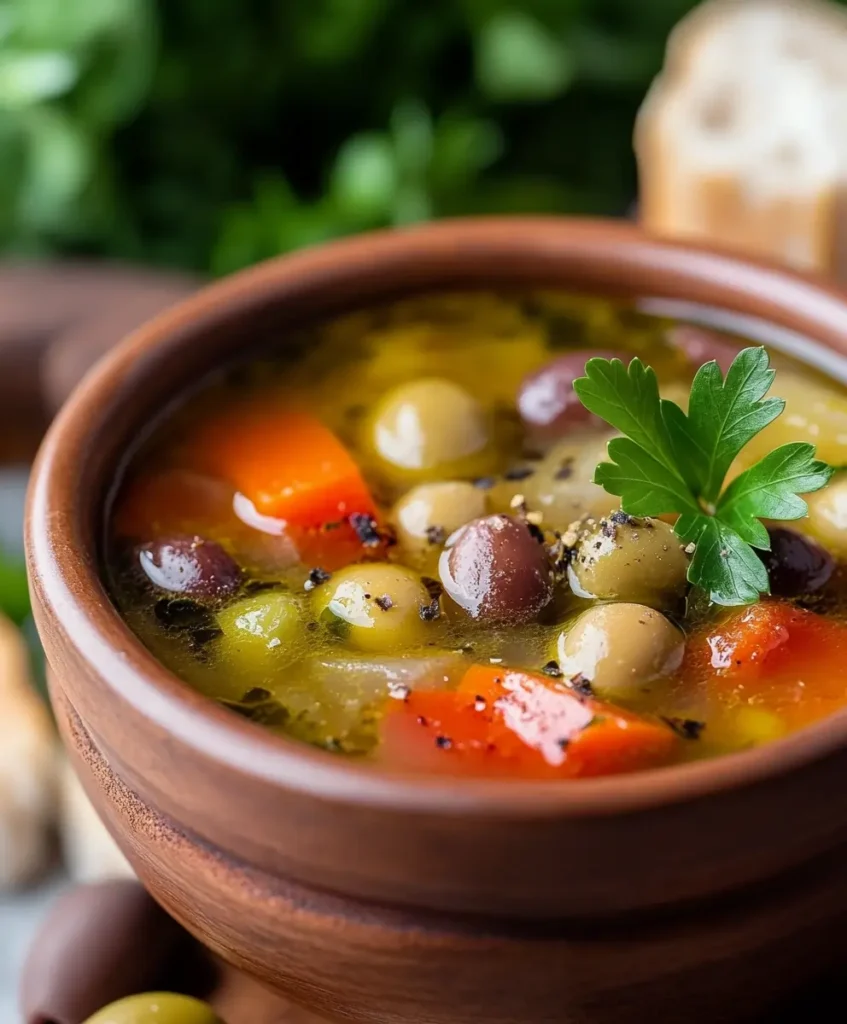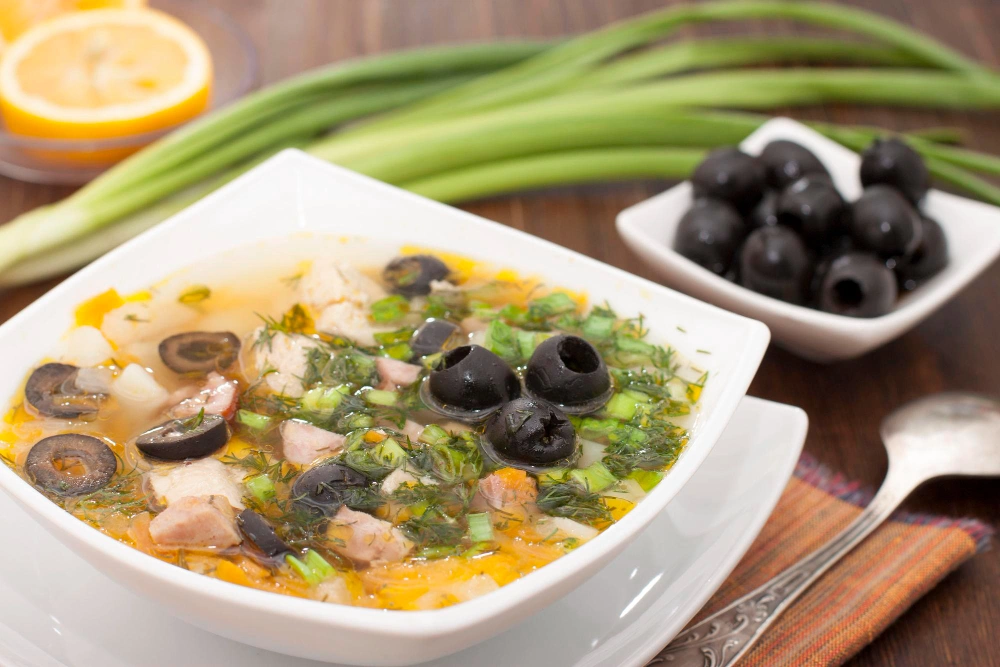What is Olive Soup?
Olives soup is a delightful dish that celebrates the rich flavors of olives, often combined with various vegetables, herbs, and spices. Traditionally, this soup is associated with Mediterranean cuisine, where olives play a central role. Its unique taste profile, which balances the briny notes of olives with the freshness of other ingredients, makes it an exceptional choice for those seeking something flavorful yet comforting.
Typically, olives soup can vary greatly in texture and flavor, depending on the region and the specific recipe. For instance, some variations may emphasize a creamy consistency, while others might lean towards a broth-like quality. Regardless of the preparation style, olives soup consistently showcases the versatility of olives, making it a beloved dish among food enthusiasts.
Health Benefits of Olive Soup
Incorporating olive soup into your diet offers numerous health benefits, primarily due to its key ingredients. First and foremost, olives themselves are rich in healthy fats, particularly monounsaturated fats, which can support heart health. Additionally, olives are packed with antioxidants, which help combat oxidative stress in the body.
Olives soup also typically includes a variety of vegetables, each contributing unique nutrients. For example, tomatoes, often included in olive soup recipes, are a fantastic source of vitamins C and K. Moreover, the inclusion of garlic not only adds flavor but also possesses anti-inflammatory properties.
Overall, consuming olives soup can be a delicious way to boost your intake of essential nutrients, promoting overall well-being. It’s a satisfying dish that combines taste with health benefits, making it a smart choice for any meal.

Ingredients for the Perfect Olive Soup
To create a delicious olives soup, it’s crucial to gather the right ingredients. Here’s a list of essential components you should consider:
- Olives: Use a mix of green and black olives for depth of flavor.
- Vegetables: Common choices include onions, garlic, carrots, and celery.
- Broth: Vegetable or chicken broth serves as the base of the soup, enhancing the overall taste.
- Herbs and Spices: Fresh herbs like thyme or rosemary can elevate the flavor profile.
- Acid: A splash of lemon juice or vinegar adds brightness to the dish.
By carefully selecting these ingredients, you can ensure that your olives soup is both flavorful and nourishing. Remember, the quality of your ingredients will significantly impact the final result, so opt for fresh and high-quality items whenever possible.
By combining these ingredients, you can create a vibrant olive soup recipe that is both satisfying and nutritious.
Step-by-Step Olive Soup Recipes
Creating olive soup is a straightforward process. Below are two popular recipes to help you get started.
Classic Olive Soup Recipe
- Preparation: Start by chopping one onion, two carrots, and two celery stalks. Mince three cloves of garlic.
- Sauté: In a large pot, heat two tablespoons of olive oil. Sauté the vegetables until they soften, approximately 5-7 minutes.
- Add Broth: Pour in four cups of vegetable broth and bring it to a simmer.
- Incorporate Olives: Add one cup of pitted and chopped olives, then season with salt, pepper, and fresh herbs.
- Simmer: Let the mixture simmer for about 20 minutes to blend the flavors.
- Blend: For a creamy texture, you may use an immersion blender to puree the soup to your desired consistency.
Creamy Olive Soup Recipe
- Ingredients: Gather one cup of pitted olives, one onion, two cloves of garlic, and four cups of vegetable broth.
- Sauté: In a pot, heat three tablespoons of olive oil and sauté the chopped onion and minced garlic until fragrant.
- Combine: Add the broth and olives, bringing the mixture to a gentle boil.
- Blend: Use an immersion blender to puree the soup until smooth.
- Finish: Stir in half a cup of heavy cream and season with salt, pepper, and a squeeze of lemon juice before serving.
These recipes provide a foundation for creating delicious olive soup. Feel free to customize them with your favorite ingredients to suit your taste preferences.
Serving and Pairing Olive Soup
Serving olive soup can be both simple and elegant. To enhance the dining experience, consider these pairing suggestions:
- Bread: Serve with crusty bread or garlic bread for dipping.
- Salad: A light green salad can complement the richness of olive soup beautifully.
- Cheese: A platter of assorted cheeses pairs well, offering a delightful contrast in flavors.
When presenting olive soup, consider using rustic bowls to evoke a Mediterranean ambiance. Garnishing the soup with fresh herbs or a drizzle of olive oil also adds a touch of sophistication.

Olive Soup in Modern Cuisine
In recent years, olive soup has gained popularity in modern cuisine, particularly within gourmet restaurants. Chefs are increasingly experimenting with this dish, introducing unique flavors and presentation styles. For instance, some may incorporate exotic spices or unusual ingredients, such as saffron or roasted peppers, to elevate traditional recipes.
Moreover, olive soup is becoming a common feature in health-conscious menus, thanks to its nutritious profile. Many chefs recognize that diners are seeking dishes that not only taste great but also provide health benefits. As a result, olive soup is being reimagined in various forms, including chilled versions for summer or hearty variations for winter.
Additionally, social media has played a significant role in popularizing olive soup, with visually appealing presentations capturing the attention of food lovers. This trend encourages home cooks to experiment with olive soup, leading to a resurgence of interest in this classic dish.
FAQ’s
Is olive oil good in soups?
Yes, olive oil is excellent in soups! It adds a rich, fruity flavor and enhances the overall taste profile of the dish. Moreover, it can provide a smooth texture and a pleasant aroma. Using high-quality extra virgin olive oil can elevate the flavor of your soup, making it more delicious. Additionally, olive oil is known for its health benefits, including heart-healthy fats and antioxidants, which can contribute positively to your meal.
What flavors go with olives?
Olives have a unique, briny flavor that pairs well with various ingredients. Some complementary flavors include:
- Citrus: Lemon and orange enhance the brightness of olives.
- Herbs: Fresh herbs like rosemary, thyme, and parsley can elevate the dish.
- Garlic: The pungency of garlic balances the saltiness of olives.
- Cheese: Feta or goat cheese provide a creamy contrast.
- Vegetables: Tomatoes, peppers, and greens work harmoniously with olives.
By combining these flavors, you can create dishes that highlight the deliciousness of olives, whether in salads, pastas, or soups.
When not to cook with olive oil?
While olive oil is versatile, there are certain situations where it may not be the best choice for cooking:
- High-Temperature Cooking: Olive oil has a lower smoke point compared to some oils, like canola or avocado oil. Therefore, it’s best to avoid using it for deep frying or high-heat sautéing.
- Baking: In some baking recipes, the distinct flavor of olive oil may not be desirable, especially when a neutral taste is needed.
- Certain Dressings: If a recipe calls for a very delicate flavor, using olive oil might overpower the other ingredients.
Choosing the right oil based on the cooking method and desired flavor is essential for achieving the best results in your dishes.
Does olive oil thicken soup?
No, olive oil does not thicken soup on its own. While it can add richness and a velvety texture, it lacks the properties needed to thicken liquids. To thicken soup, you can use methods such as blending some of the soup, adding starches like flour or cornstarch, or incorporating pureed vegetables or legumes. Olive oil can still be a wonderful addition, enhancing the flavor and mouthfeel of the soup without serving as a thickening agent.

Conclusion: Why Olive Soup Deserves a Place on Your Table
Olive soup is a unique and flavorful dish that deserves a spot on your table, whether you are a fan of Mediterranean cuisine or simply looking for a new and exciting recipe to enjoy. With its rich, briny depth and harmonious blend of ingredients, this soup offers a comforting yet sophisticated dining experience that can be appreciated by food lovers of all kinds.
One of the key reasons olive soup stands out is its distinctive flavor profile. The natural brininess of olives, when combined with aromatic herbs, garlic, onions, and a well-balanced broth, creates a depth of taste that is both bold and comforting. Depending on the variation, whether creamy or broth-based, this dish can be customized to suit different palates, making it an adaptable addition to any menu.
Beyond its taste, olive soup is also a powerhouse of nutrition. Olives are packed with healthy monounsaturated fats, antioxidants, and essential vitamins, contributing to heart health and overall well-being. When paired with fresh vegetables, legumes, or even a touch of citrus, the soup becomes a nourishing and satisfying meal option that supports a balanced diet.
Additionally, this dish embodies the warmth and simplicity of Mediterranean cooking, a cuisine known for its wholesome ingredients and health benefits. Whether served as a light starter, a hearty main course, or an elegant appetizer at a dinner party, olive soup brings a touch of rustic charm and gourmet sophistication to any occasion.
Moreover, olive soup is easy to prepare, requiring only a handful of high-quality ingredients and minimal effort to achieve a dish bursting with flavor. Whether blended into a velvety smooth texture or left chunky for a rustic feel, its versatility allows home cooks to experiment and make it their own. It pairs beautifully with crusty bread, fresh herbs, or a sprinkle of cheese, enhancing the overall dining experience.
In conclusion, olive soup is an underrated gem that deserves recognition for its bold flavors, nutritional benefits, and cultural significance. Its ability to be both comforting and elegant makes it an excellent choice for those looking to explore new tastes while enjoying a wholesome and satisfying dish. If you have yet to try olive soup, now is the perfect time to embrace its unique charm and make it a regular part of your culinary repertoire.


1 thought on “Olive Soup: Flavorful, Healthy, and Easy to Make”